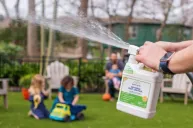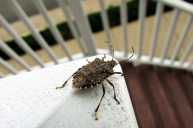It's the worst season of all, chiggers season. Sometimes called red bugs, these pesky little buggers are small and powerful and can turn your nature hike into an itchy marathon. Have you ever spent the day in the tall grass and found red bumps on your skin afterward? Chances are you got chigger bites.
Videos by Wide Open Country
Thankfully there are a few ways to prevent chiggers from turning your sunny afternoon into an itch-fest.
What are Chiggers?
Scientifically known as "trombiculid mites," these red bugs are almost impossible to see with the naked eye and cause intense itching when they bite human skin. Members of the arachnid family (the same family as spiders and ticks) chiggers love to live in grassy areas as well as around lakes and streams all over the United States. If the temperature is between 77 and 86 degrees, chigger mites are ready to bite. When chiggers bite they attach to the host (you) and inject enzymes to soften up the skin cells. The mites then suck up the digested tissue, making a meal of it. And get this, chiggers can sit on the skin for up to four days, feeding the entire time. How's that for making you want to take a shower ASAP.
How to Treat Chigger Bites
According to health experts, chigger bites can take up to three weeks to fully heal. If you feel like you have chiggers on your skin, immediately wash the area with soap and hot water to get rid of any bugs. Avoid itching the area to prevent infection and use over-the-counter anti-itch creams such as calamine lotion or hydrocortisone to help with the itching and prevent blisters. People have also used oral antihistamines such as Benadryl for relief. Avoid hot showers and hot baths to keep the skin calm. Seek medical advice if the bug bites become infected and you feel ill.
How to Repel Bugs Naturally
For starters, repel bugs by wearing long-sleeved shirts and long pants if in an area with long grass. Plant marigolds and mint around your property to act as a natural insect repellent and keep your grass cut short to prevent infestations. Other home remedies include spraying yourself with vinegar or a natural insect repellent.




